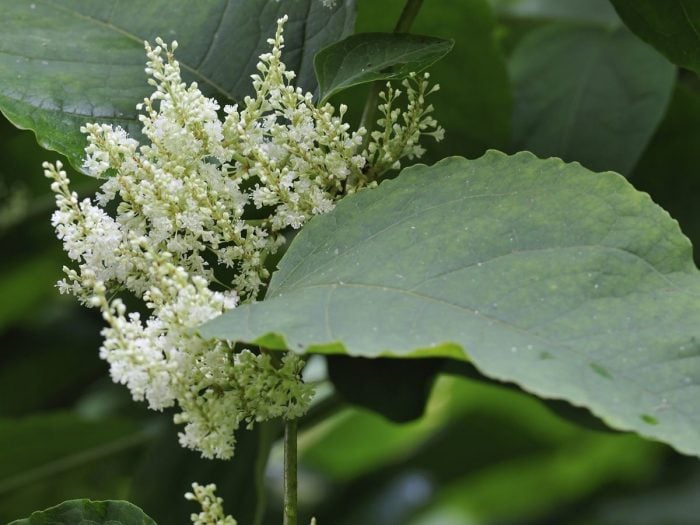The most important health benefits of Japanese knotweed may include its ability to prevent and treat cognitive disorders, improve heart health, reduce gastrointestinal distress, lower blood pressure, maintain proper insulin levels, and many other unique benefits.
What is Japanese Knotweed?
Japanese knotweed has been used as a spring vegetable for centuries in Asian cultures and is used for various agricultural and bee-keeping activities. The plant is so highly praised because of its high content of one particular chemical, resveratrol. Studies have shown that the roots of the plant contain a much higher level of resveratrol than the leaves and the stems. [1] [2]
Japanese knotweed is native to East Asia, primarily Japan, Korea, and China, and is scientifically known as Fallopia japonica. It is a large, perennial herbaceous plant that has become an important cultural, medicinal, culinary, and ceremonial herb for a number of Asian cultures over the centuries. In other countries of the world, Japanese knotweed is sometimes considered invasive, as it is quite hardy and can grow quickly; it can also be found in North America and Europe, as well as in limited amounts in Australia. In certain countries and regions, billions of dollars have been spent trying to control the outbreaks of Japanese knotweed, as it can easily overtake other crops and vegetation. [3]

Knotweed is an herb used for cough, cold, and many respiratory disorders. Photo Credit: Shutterstock
While a lot of debate and study is still ongoing, supplemental and nutritional consumption of Japanese knotweed does seem to hold significant potential. Now, let’s take a closer look at some of the health benefits of Japanese knotweed.
Health Benefits of Japanese Knotweed
Health benefits of Japanese knotweed include:
May Improve Cognitive Impact
One of the most well known and widely relied on benefits of Japanese knotweed may be its apparent effect on cognitive disorders. This may be primarily due to the resveratrol content of the herb, which is the same for most of the plant’s benefits. Resveratrol has shown a measurable preventative effect against neurodegenerative processes that can affect neural pathways (RS Turner et al., 2015). Just as antioxidants can eliminate plaque and neutralize free radicals that can slow mental function and cause deterioration, resveratrol may help keep brain pathways energized and in use, preventing those tragic conditions. [4]
May Improve Blood Pressure
Early research on resveratrol’s effect on the heart primarily centered on a reduction in fat, there may have also been encouraging results regarding resveratrol’s ability to modulate blood pressure. By reducing strain and stress on the heart, lower blood pressure may significantly lower the risk of heart attacks and strokes by keeping the arteries and blood vessels dilated, preventing blood clots. [5]
May Provide Relief From Gastrointestinal Concerns
If you are suffering from stomach issues, such as constipation, bloating, cramps, inflammation, or chronic pain, Japanese knotweed may be just what the alternative medical practitioner ordered! By adding resveratrol-rich herbs to your diet, you might significantly reduce gastrointestinal distress, and the herb may also act as a mild laxative, which can help clear out your system and get your digestive processes back to normal. [6]
May Help In Insulin Control
Over time, particularly if we have a poor diet, our body becomes less able to regulate its insulin levels, and may develop “insulin resistance”. This can lead to diabetes and many other health complications, but if you add Japanese knotweed to your diet, you can effectively avoid all of that. The resveratrol in Japanese knotweed might help decrease insulin resistance while improving insulin sensitivity, helping in blood sugar regulation. [7]
Word of Caution: Taking an excessive amount of Japanese knotweed can result in negative reactions, but if you follow the dosage guidelines and use the herb in moderation, the chances of an allergic reaction are small. If you are allergic to resveratrol, which some people are, you should avoid any use of this herb.
